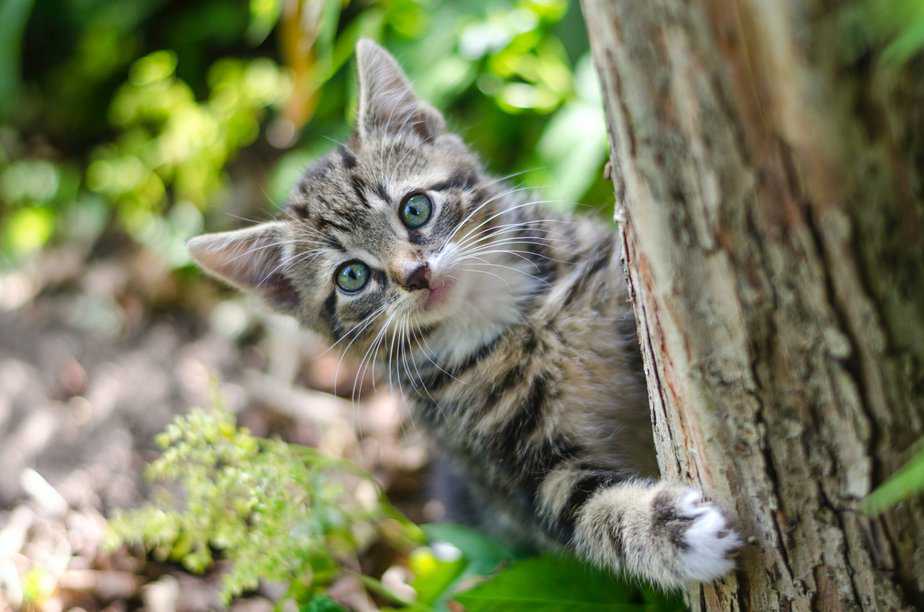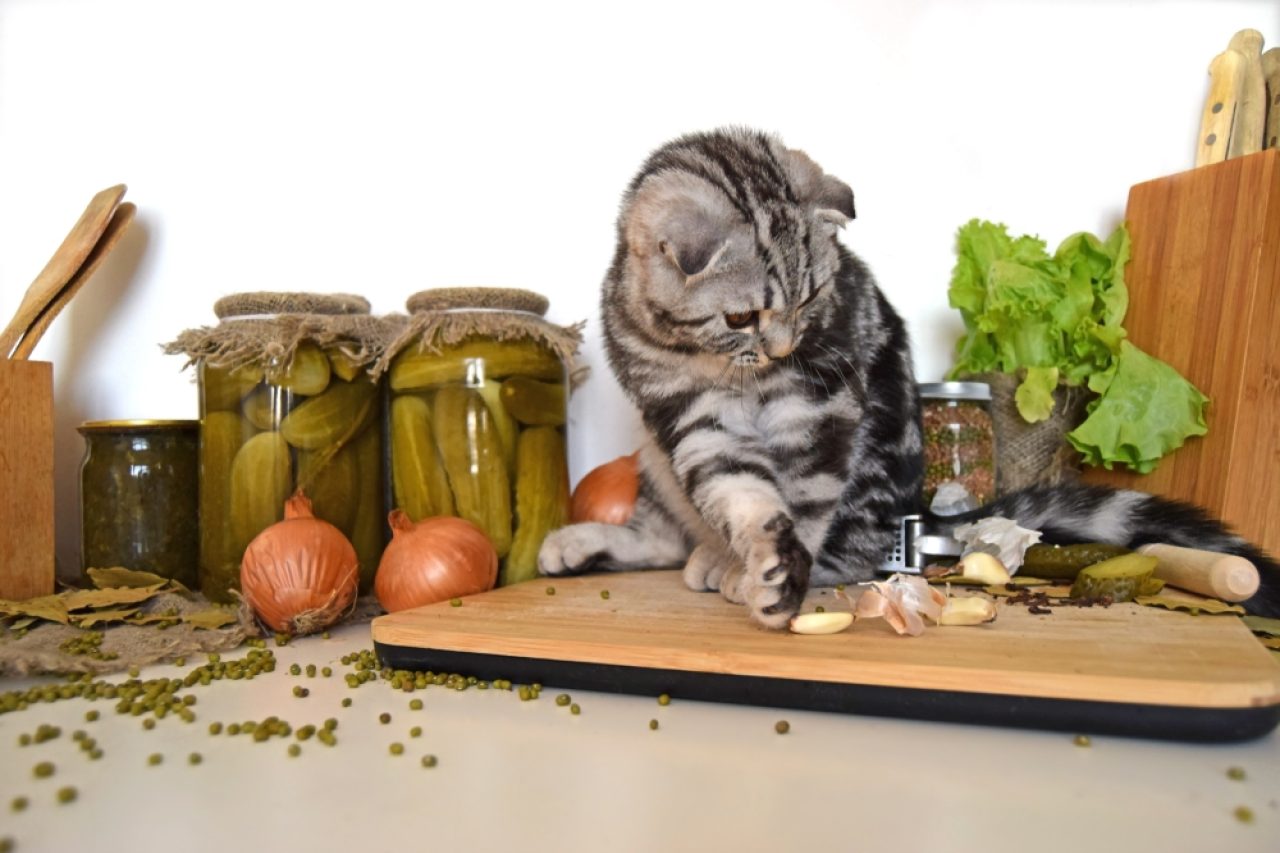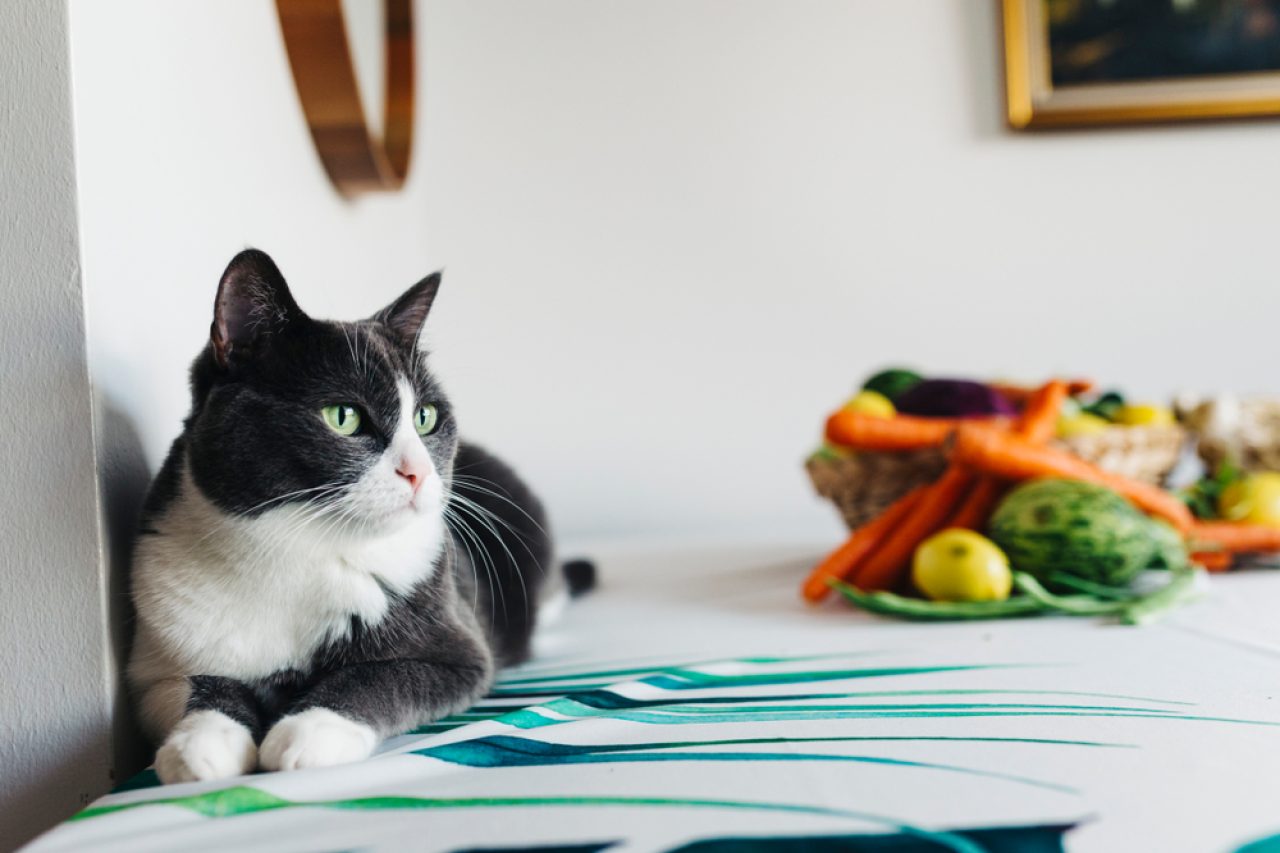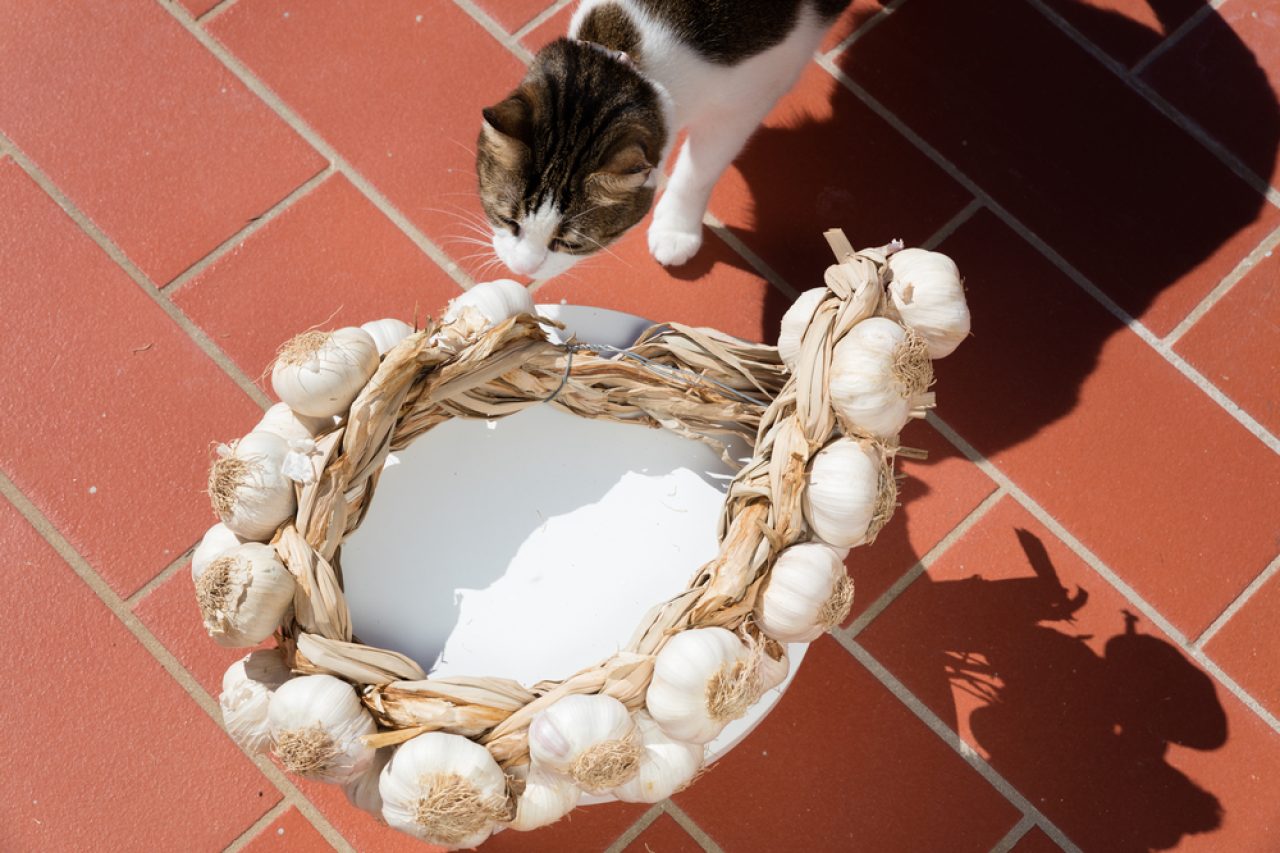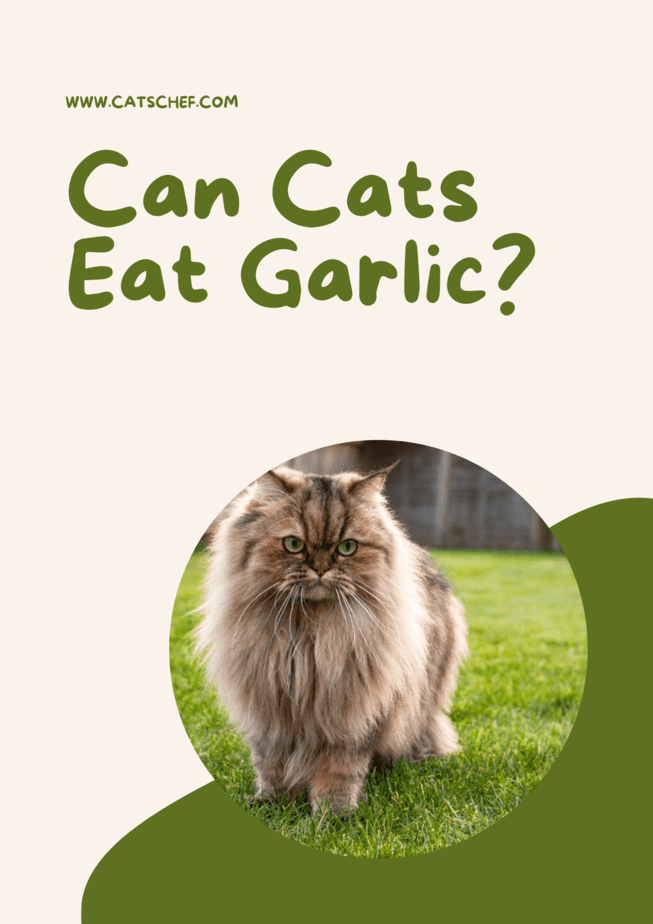📖 Table of Content:
“Can cats eat garlic?”. You’re sitting in the dark, trying to unwind from a really, REALLY exhausting day at work. You’re thinking of running yourself a bath, reading your favorite book, and pampering yourself before heading off to sleep… when you hear a suspicious noise.
“That’s coming from the kitchen.”, you think to yourself as you slowly get up to check what’s happening. “Mrs. McFluffer, are you there?”, you summon your four-legged friend thinking she’s gotten herself in trouble again. “Come here kitty, kitty!”
You’re slowly approaching your kitchen door when you see a shadow run across the hallway. You gasp, hoping that’s your imagination playing tricks on you. You can sense an odd fragrance coming from the kitchen. But, you can’t put your finger on what that could be.
“Wait, could that be garlic?”, you ask yourself when that terrifying shadow runs across the hallway again. “Oh no, that’s a vampire!”, everything becomes apparent as you scream in terror and turn on every single light you can get your hands on.
“It’s a… It’s a…”, you try to get the words out but can’t. “Wait, it’s just a cat! Oh, Mrs. McFluffer, what are you doing with that clove of garlic?!” You can feel the burden lifting off of your shoulders as a question settles inside of your head. “Can cats even eat garlic?”
Worry not; your haste Google search brought you to the right place. Our friends over at the ASPCA (American Society for the Prevention of Cruelty to Animals) don’t recommend feeding garlic to your cat. Actually, garlic’s one of the most poisonous veggies your cat can munch on.
So, here’s everything you need to know before your mischievous monster decides to pull off another one of those stunts on you.
Can cats eat garlic?
Feel free to repeat these words out loud a couple of times for everyone to hear. “Cats can’t eat garlic under any circumstances!”. There’s pretty much no reason why your cat would even want to munch on this vegetable.
Not only do cats find that familiar garlic aroma absolutely REPULSIVE. But, they don’t even need this veggie (or other veggies) in their diet. Actually, cats are carnivores which means they pretty much only need meat, animal protein, and animal nutrients to survive and thrive.
They don’t need fruits, veggies, and whole grains the same way humans do (hint – humans are omnivores). They don’t even possess the enzymes necessary to break down and process most foods humans eat on a regular.
Cats are VERY different from me and you. That’s an important thing to remember when you’re considering switching up your cat’s diet or doing anything you haven’t gotten approved by your vet. Trust me; you don’t want the garlic to become the thing that proves to you how fragile your cat’s health could be.
So, what’s so dangerous about garlic? Garlic’s a member of the Allium family alongside onions, shallots, chives, and leeks. Each member of the Allium family contains compounds known as disulfides and thiosulphates which are what make them poisonous to cats.
These compounds can damage and break down your cat’s red blood cells causing conditions known as hemolytic anemia, Heinz body anemia, and methemoglobinemia. And don’t even get me started on the fact that eating any of the members of the Allium family can lead to poisoning.
What happens when cats eat garlic?
Oh boy, you don’t even want to know what happens when your curious creature gets her paws on the garlic! But, on the off chance that you’re having a hard time understanding this whole “cats can’t eat garlic” thing, you might want to take a closer look at what to expect.
First things first, garlic’s poisonous to cats regardless of the amount they consume. Their reaction depends on a couple of factors – age, weight, breed, and even the type of garlic they’ve munched on (fresh, dried, powered…).
More times than not, a cat that’s eaten a little bit of garlic might experience symptoms of garlic toxicity (toxicosis or poisoning). These symptoms are typically gastrointestinal and they include anything ranging from stomachache and discomfort to nausea, drooling, vomiting, and diarrhea.
On the other hand, more severe symptoms might allude to anemia. Such symptoms include weakness, lethargy, loss of appetite, loss of coordination, paleness of the gums, and increased heart rate and respiratory rate.
Every cat’s different which means every cat reacts differently to these symptoms. Some breeds have been proven more sensitive to symptoms of garlic poisoning. These include Siamese, Burmese, Singapura, Turkish Angora, Oriental Shorthair, and Japanese Bobtail.
How much garlic can cats eat?
Garlic’s poisonous to cats regardless of the amount or the type, but… There’s always a but when we’re talking about different foods cats can or can’t eat. There’s a difference between nibbling on a fresh clove of garlic and munching on bread that contains a minuscule amount of garlic powder.
“How much garlic’s too much garlic!?” Here’s the thing. Some people claim that even the smallest amount, (one clove or 197 milligrams of garlic powder) can lead to garlic poisoning.
Other people claim that anything over 5 grams per kilogram of a cat’s body weight can cause symptoms of garlic poisoning to appear. And we can’t forget about the people that claim that cats with current health problems can’t deal with an even smaller amount of garlic.
Your cat’s better off munching on something else. Not only that, but she’s better off not coming close to a single clove of garlic for the rest of her life. Regardless of the amount that she can potentially digest without repercussions, you should stay on the safe side of things.
What to do when your cat eats garlic?
Contact your vet IMMEDIATELY! We don’t know how else to illustrate the urgency of the situation. But, your cat can’t eat garlic under any circumstances. And when she does, there’s a pawsibility that she won’t experience symptoms of poisoning FOR DAYS.
The most responsible thing you can do for yourself and your cat seems to be to keep an eye out for her at any moment. For example, when she’s roaming around the apartment not knowing what to do with herself. Or when she’s making weird noises while playing with something she shouldn’t play with.
Or even when she’s clearly plotting to snatch the leftover garlic bread you baked because you were having some friends over for dinner. You’re better off avoiding the situation completely than dealing with the aftermath.
But, when you do have your suspicions that she might have gotten into your secret garlic stash, contact your vet immediately. Don’t wait for the first symptoms to appear. Make sure you schedule a visit or take her to the emergency animal center. They should be able to provide her with the support and care that she needs.
What’s the deal with garlic and fleas?
Okay, so the answer to the question “can cats eat garlic” is ‘No,’ but who’s to say they can’t use garlic to get rid of fleas? These pesky passengers have been messing with your cat’s head for A WHILE. And, you’ve stumbled upon a couple of articles claiming that the two of you can work things out with a single clove of garlic.
But, now you’re learning that cats can’t eat garlic and you’re confused. “Can they, can’t they!? What’s the scoop on this one?” Those articles weren’t lying when they made those claims. Garlic can actually be used as a flea repellent, only not by your cat.
The risks outweigh the benefits. Some of that garlic could rub off of your cat’s hair or somehow end up around her mouth out of her snout. Every single one of those scenarios could send your cat to the emergency animal center which means you’re better off using an alternative flea repellent.
Give catnip, coconut oil, or even olive oil a try, and let us know how it goes! Other than that, make sure your four-legged friend steers clear of garlic and the Alliums. What a dangerous family they are!
